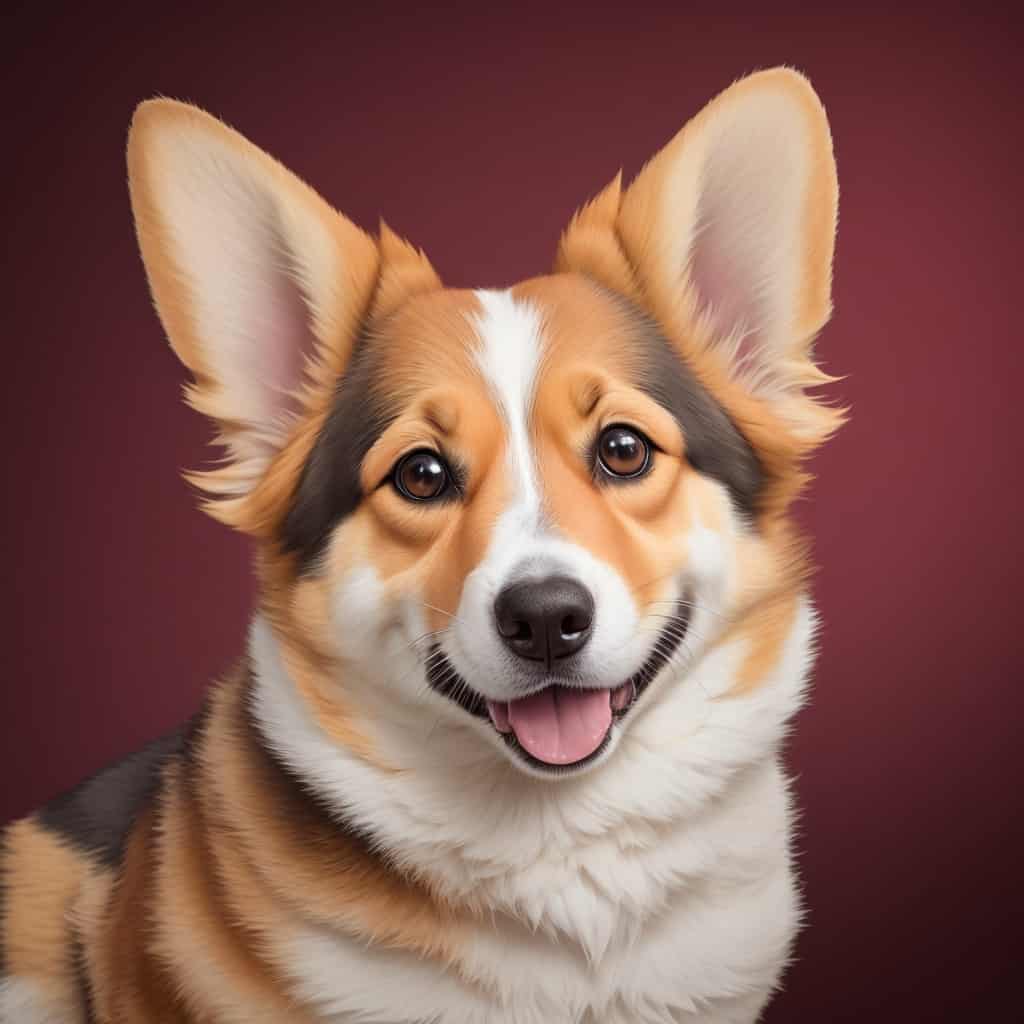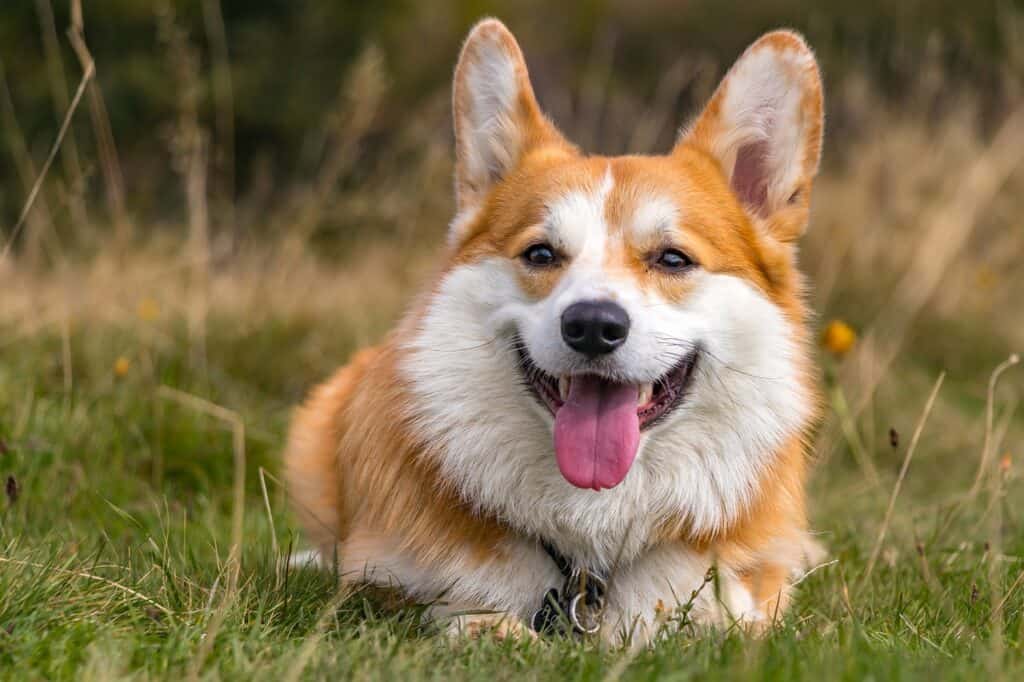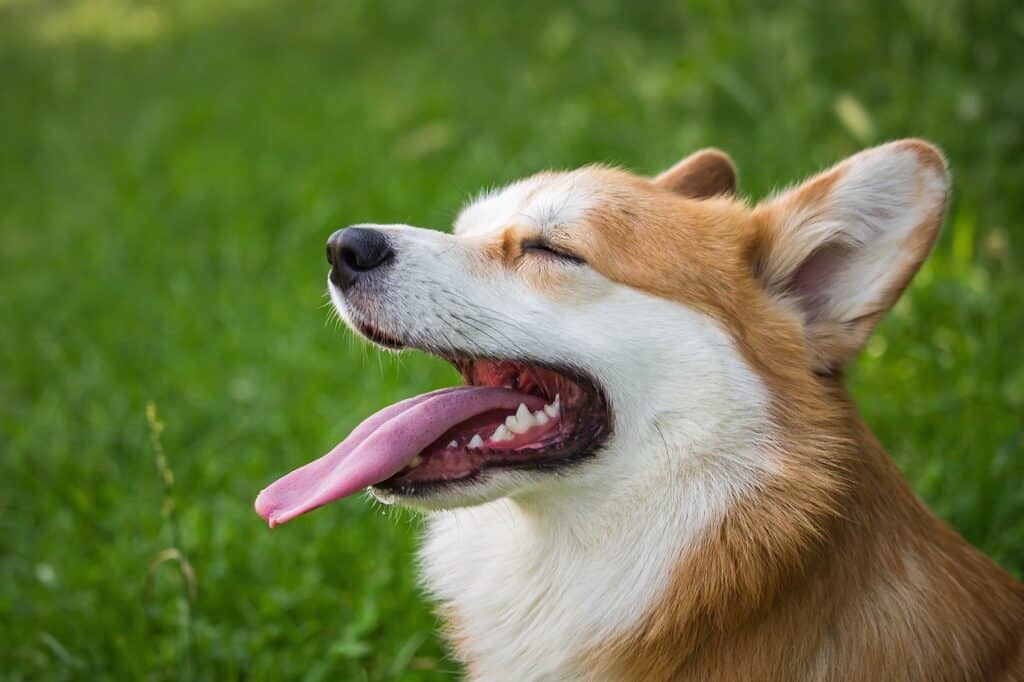The Pembroke Welsh Corgi, a charming and lively breed, known for its unwavering loyalty and distinctive appearance, has earned its place in the hearts of dog enthusiasts and families. With a heritage in Wales, adorable physical features, and a unique set of temperament traits, this breed is celebrated as an affectionate and versatile companion.

| Category (Explanation) | Breed Information |
|---|---|
| Year of Breed Conception | 12th century |
| Country of Origin | Wales, United Kingdom |
| Weight (lbs & kg) (Male) | 28-30 lbs (12.5-13.5 kg) |
| Weight (lbs & kg) (Female) | 25-28 lbs (11-12.5 kg) |
| Coat Type | Medium-length double coat |
| Color Variations | Various colors, often red or tri-color |
| Shedding Level (Low, Moderate, High) | Moderate |
| Height (cm & in) | 10-12 inches (25-30 cm) |
| Breed Size | Small |
| Trainability (Low, Moderate, High) | High |
| Mental Needs (Low, Moderate, High) | Moderate |
| Intelligence Level (Low, Moderate, High) | High |
| Energy Level (Low, Moderate, High) | Moderate |
| Agility (Low, Moderate, High) | Moderate |
| Loyalty (Low, Moderate, High) | High |
| Playfulness (Low, Moderate, High) | Moderate |
| Exercise Needs | Regular exercise and mental stimulation |
| Guarding Proficiency (Low, Moderate, High) | Low |
| Sociability with Children (Low, Moderate, High) | High |
| Barking Level (Low, Moderate, High) | Moderate |
| Digging Tendency (Low, Moderate, High) | Low |
| Destructive Behavior (Low, Moderate, High) | Low |
| Drooling Level (Low, Moderate, High) | Low |
| Obedience Level (Low, Moderate, High) | High |
| Apartment Friendly (Yes/No) | Can adapt to apartment living with sufficient exercise |
| Inherent Prey Drive | Moderate |
| Physical Risk to Others (Low, Moderate, High) | Low |
| Travel Fatality Risk (Low, Moderate, High) | Low |
| Allergen Potential | Low |
| Health Concerns (List of Common Health Concerns) | Hip Dysplasia, Eye Issues, Intervertebral Disc Disease |
| Average Life Expectancy (Life Expectancy in Years) | 12-13 years |
Woof Mastery is reader supported and our articles may contain affiliate links.
Instead of running third party ads that we have no control of we only use links from high-quality companies we are directly partnered with. Making use of these links come at no cost to you our reader, and in many cases have the extra benefit of discounted rates or sign up bonuses.
If you’re interested you can read more about our affiliate policy here.
We appreciate your support and always insure that the products and services we recommend are high-quality, helpful and relevant to the subject at hand!
The Pembroke Welsh Corgi’s history is deeply intertwined with Welsh folklore and herding traditions. These dogs have been herding livestock in the hills of Wales for centuries.
Their low stature allowed them to nip at the heels of cattle and sheep without getting kicked. They were cherished for their herding abilities and loyalty to their human companions.
Today, Pembroke Welsh Corgis are celebrated for their friendly and spirited nature. They have become beloved family pets, embodying the charm and heritage of Wales.

What sets the Pembroke Welsh Corgi apart is its charming appearance and playful personality. These herders may be small, but their intelligence and affection make them exceptional companions for individuals and families alike.
Pembroke Welsh Corgis have a history as herding dogs in Wales. Despite their small size, they exhibited exceptional herding instincts, nipping at the heels of cattle and other livestock. Their low stature allowed them to avoid kicks from livestock. Today, they maintain their herding abilities in dog sports and are treasured family pets, preserving their tradition as agile and dependable working dogs.
Pembroke Welsh Corgis are known for their spirited and affectionate personalities. They are intelligent, agile, and have a strong desire to please their owners. Despite their small size, they have a history of herding cattle.
Their intelligence and trainability make them quick learners, and they form strong bonds with their human families. Pembroke Welsh Corgis are characterized by their playfulness, devotion, and a loving nature, epitomizing the ideal blend of agility and companionship.
Pembroke Welsh Corgis are affectionate, alert, and intelligent. They are typically good with children and other pets but can be reserved with strangers. Early socialization helps them adapt well to various situations.
They require mental and physical stimulation to stay happy.
Pembroke Welsh Corgis are small to medium-sized dogs with a well-proportioned and sturdy build. They have a fox-like head with alert, dark eyes and erect, pointed ears.
They have a double coat with a dense, weather-resistant outer coat. Coat colors can include red, sable, brindle, black, and blue merle with white markings. Their tail is often naturally bobbed or short.
Males typically stand between 10 to 12 inches (25-30 cm) at the shoulder and weigh between 27 to 30 pounds (12-14 kg), while females are slightly smaller and lighter.
Pembroke Welsh Corgis have a lively and alert presence, reflecting their herding heritage.
Pembroke Welsh Corgis exhibit various coat colors, including red, sable, brindle, black, and blue merle, often with white markings. They may not have distinct coat colors.
Pembroke Welsh Corgis typically exhibit solid coat colors in red, sable, brindle, black, or blue merle with white markings rather than distinct coat patterns.
Pembroke Welsh Corgis have a moderate shedding level. They shed year-round with seasonal variations. Regular grooming and brushing can help reduce shedding and maintain a healthy coat.
Pembroke Welsh Corgis have a double coat that requires regular grooming to keep it healthy and minimize shedding. Grooming habits for this breed include:
1. Brushing: Regular brushing, about once or twice a week, is essential to prevent matting and remove loose fur. Use a slicker brush or an undercoat rake for thorough grooming.
2. Bathing: Corgis do not need frequent baths, as their natural oils help maintain coat health. Bathe them when necessary using a dog-specific shampoo, and rinse thoroughly.
3. Ears: Check and clean their ears regularly to prevent wax buildup or infections using a veterinarian-recommended ear cleaning solution.
4. Nails: Keep their nails trimmed to a comfortable length to maintain proper gait and prevent discomfort.
5. Teeth: Dental hygiene is important. Brush their teeth regularly to prevent dental issues and bad breath. Dental chews or toys can also help.
6. Tail and Paw Care: Pay attention to the tail and paw areas, where dirt and debris can accumulate. Keep them clean and inspect for any signs of irritation or injury.
Pembroke Welsh Corgis have a moderate to high activity level and enjoy both physical and mental challenges. Key points about their activity level include:
1. Exercise Needs: Pembroke Welsh Corgis require regular exercise to stay happy and healthy. Daily walks, playtime, and interactive activities are beneficial.
2. Energy Level: They have moderate to high energy levels, especially when young. Regular exercise helps maintain their well-being.
3. Herding Heritage: Historically, Pembroke Welsh Corgis were bred for herding livestock. They excel in activities like obedience, agility, and herding trials.
4. Mental Stimulation: In addition to physical activity, mental challenges through training and puzzle toys are important to keep them mentally sharp.
5. Family Dogs: They are known to be excellent family pets and enjoy activities with their human companions, such as agility and obedience.
Beaucerons are highly intelligent dogs known for their problem-solving abilities. Here are some key points about their intelligence:
Beaucerons’ exceptional intelligence and versatility make them excel in a variety of roles. Training, socialization, and mental stimulation are vital for their development and well-being.
Pembroke Welsh Corgis are intelligent and need mental stimulation. Engage them in obedience training, puzzle toys, and interactive games to keep their minds sharp.
Social Interaction: They are social dogs and need regular interaction with their human family. Loneliness can lead to anxiety or destructive behavior, so provide companionship and attention.
Exercise: Mental exercise is equally important. Offer them tasks that challenge their problem-solving skills.
Training and Obedience: Pembroke Welsh Corgis benefit from obedience training and activities that engage their minds, which not only stimulates their mental needs but also reinforces their bond with their owners.
Enter The Woof Mastery

If you’re considering a Pembroke Welsh Corgi, here are some important factors to know:
1. Activity Level: Corgis are active dogs that require regular exercise and mental stimulation.
2. Training Commitment: They are intelligent but can be stubborn, so consistent training is important.
3. Space: Corgis adapt well to smaller living spaces but need outdoor playtime.
4. Shedding: They have a moderate shedding level, and regular grooming helps manage their coat.
5. Herding Instinct: Corgis may display herding behaviors, such as nipping at heels.
Pembroke Welsh Corgis, while small in size, may pose a physical risk to others if not properly socialized, trained, or managed. The risk assessment factors include:
1. Protective Instinct: Corgis may have a protective instinct, especially towards their family or territory. Proper training is essential to manage this instinct.
2. Socialization: Early and thorough socialization is crucial to ensure Corgis are comfortable around people and other animals. Poor socialization can lead to fear or aggression.
3. Training: Obedience training is essential to teach Corgis appropriate behavior and ensure they respond to commands. Well-trained dogs are less likely to engage in aggressive behavior.
4. Owner Responsibility: Responsible ownership involves being aware of the dog’s behavior and taking necessary precautions in public settings.
5. Breed-Specific Legislation (BSL): Corgis are not commonly subject to BSL, but owners should be aware of local regulations.
6. Individual Variability: Each dog is unique, and behavior can vary. Responsible ownership, proper training, and socialization are key to minimizing the potential physical risk to others.
Pembroke Welsh Corgis are often good with children. They are affectionate and enjoy playtime. Their herding background may make them try to herd kids, but this behavior is generally manageable. Proper socialization is crucial for their interactions with children.
Pembroke Welsh Corgis can be good swimmers, despite their shorter legs. They often enjoy being in the water and can paddle. However, always be cautious with their safety in the water and provide close supervision, especially if they are swimming in deep or strong currents.
Early and positive training will help your Pembroke Welsh Corgi puppy become a well-behaved and devoted companion.
Pembroke Welsh Corgis are typically moderate in terms of noisiness. They may bark to alert their owners to potential threats or strangers, but their barking is usually not excessive.
Pembroke Welsh Corgis thrive in homes that provide:
Challenges:
Traveling with Pembroke Welsh Corgis involves these considerations:
Pembroke Welsh Corgis are generally healthy, but they may be prone to certain health concerns, including:
Proper nutrition is vital for Pembroke Welsh Corgis. Follow these nutritional habits:
Proper nutrition is essential for the health and well-being of Pembroke Welsh Corgis.
Breed-specific laws (BSL) may affect Pembroke Welsh Corgis in particular areas, and it’s important for owners to be aware of these regulations. BSL is typically enacted at the local or municipal level and can vary widely from one jurisdiction to another. Here are some types of restrictions that Pembroke Welsh Corgis may face under BSL:
The rationale for BSL is often based on concerns about public safety and perceived risks associated with specific breeds. While Pembroke Welsh Corgis are not inherently aggressive, they can be affected by BSL due to their physical resemblance to breeds that are sometimes included in these laws.
It’s important to note that BSL is a controversial topic, and many advocates argue that it unfairly targets breeds rather than addressing individual dog behavior. They emphasize that responsible ownership, training, and education should be emphasized instead of breed-specific restrictions.
To determine if there are breed-specific laws or restrictions regarding Pembroke Welsh Corgis in your area, you should check with your local animal control or government authorities. Be aware of and comply with any local regulations to ensure that you are in compliance with the law while owning a Pembroke Welsh Corgi.
Woof Mastery is reader supported and our articles may contain affiliate links.
Instead of running third party ads that we have no control of we only use links from high-quality companies we are directly partnered with. Making use of these links come at no cost to you our reader, and in many cases have the extra benefit of discounted rates or sign up bonuses.
If you’re interested you can read more about our affiliate policy here.
We appreciate your support and always insure that the products and services we recommend are high-quality, helpful and relevant to the subject at hand!
Myth 1: Pembroke Welsh Corgis are from Wales
Truth: While their name suggests a Welsh origin, Pembroke Welsh Corgis share their history with Cardigan Welsh Corgis in Wales. They are separate breeds.
Myth 2: They are Low-Energy Dogs
Truth: Corgis are active and require exercise. They enjoy playtime and mental stimulation, and regular physical activity keeps them healthy and happy.
Pembroke Welsh Corgis, with their distinctive appearance and lively personalities, have gained fame in various fields, and some famous examples include:
These Pembroke Welsh Corgis have showcased the breed’s charm and appeal, from the show ring to the world of entertainment.
Pembroke Welsh Corgis have a long history as herders and companions, but specific historical owners may not be widely recognized. These dogs are cherished for their intelligence and spirited personalities.
Pembroke Welsh Corgis, like all breeds, face certain challenges and dangers. Some of the greatest dangers and concerns for the breed include:
By understanding these challenges and providing responsible ownership and care, many of these dangers can be mitigated to ensure the well-being of Pembroke Welsh Corgis.
The Pembroke Welsh Corgi has roots in Wales and shares ancestry with the Cardigan Welsh Corgi. It’s believed that Viking invaders brought early Corgi-type dogs to Wales, which later interbred with local herding dogs. The breed’s development aimed to create small herding dogs with strong work ethics and herding abilities.
The Pembroke Welsh Corgi, known for its charm and intelligence, is a breed that excels in herding and companionship roles. Their affectionate nature and unique coat patterns have made them popular family pets.
Being a Pembroke Welsh Corgi owner involves providing mental and physical stimulation, grooming, and regular veterinary care. Responsible ownership includes addressing potential health concerns and embracing their herding instincts through training.
With their expressive eyes and distinctive coat patterns, Pembroke Welsh Corgis continue to capture the hearts of those who appreciate their joyful spirit and loyal companionship.